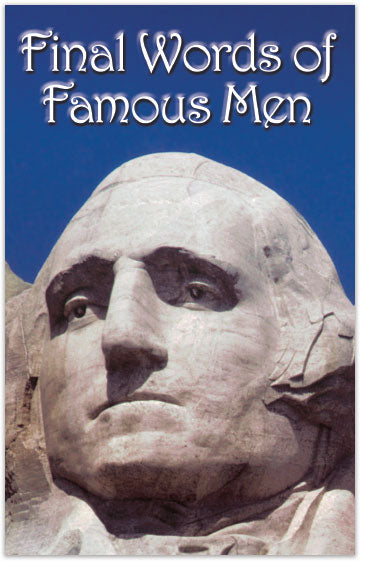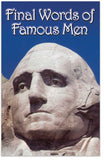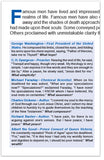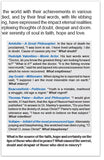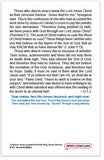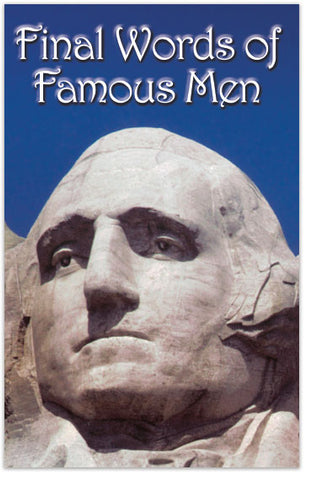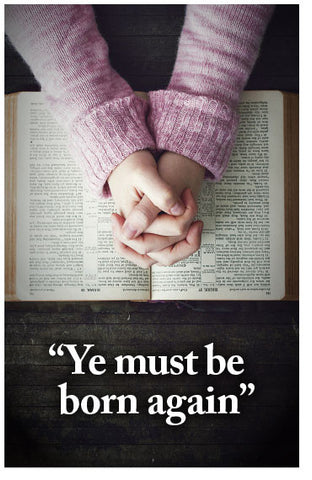Final Words of Famous Men (KJV)
Special-Order Folded Tract
 NOTE: This item is custom-printed to order (click for more details).
NOTE: This item is custom-printed to order (click for more details).
This tract is from our print-on-demand library, and is not kept in stock. Select the options below, and we will custom-print a batch just for you. Because this item is custom-printed, you can add your custom imprint to the back page at no extra cost.
- Estimated shipping date: Friday, January 2 (Click for more details)
- SKU:
- Discounts: Discount coupons do not apply to this item
- Format: Folded Tract
- Size: 3.5 inches x 5.5 inches
- Pages: 4
- Imprinting: Available with 5 lines of custom text
- Version: KJV
- Returns: Because this item is custom-printed to order, it cannot be returned.
Show all item details
The full text of this tract is shown below in the KJV version. (Do you want to print this tract in a different version than the one listed? Contact us and let us know what you're looking for—we may be able to create the alternate version for you at no charge.)
Famous men have lived and impressed the world with their achievements in various realms of life. Famous men have also died, and by their final words, with life ebbing away and the shades of death approaching, have expressed the impact eternal realities had made upon their souls. Some conveyed perplexing thoughts of doubt, despair and doom. Others proclaimed with unmistakable clarity their serenity of soul in faith, hope and love.
George Washington—First President of the United States. He composed his limbs, closed his eyes, and folding his arms upon his chest expired, saying, "Father of Mercies, take me to Thyself." What hope!
C. H. Spurgeon—Preacher. Nearing the end of life, he said, "Tranquil and happy, though very weak. My theology is very simple. I can express it in few words and they are enough to die by." After a pause, he slowly said, "Jesus died for me." What simplicity!
Michael Faraday—Chemical Scientist. When on his deathbed he was asked, "What are your speculations now?" "Speculations?" exclaimed Faraday, "I have none! No speculations now. I KNOW whom I have believed. My soul rests on certainties." What assurance!
Charles Dickens—Author. "I commit my soul to the mercy of God through our Lord Jesus Christ, and I exhort my dear children to humbly try to guide themselves by the teaching of the New Testament." What composure!
Richard Baxter—Author. "I have pain, for there is no arguing against one's senses. But I have peace; I have peace." What peace!
Albert the Good—Prince Consort of Queen Victoria. He constantly repeated "Rock of Ages" upon his deathbed. "For," said he, "If in this hour I had only my worldly honors and dignities to depend on, I should be poor indeed." What wealth!
Aristotle—A Great Philosopher. In the face of death he proclaimed, "I was born in sin. I have lived unhappily. I die in doubt. Cause of causes pity me." What doubt!
Rudolph Valentino—Movie Actor. His last words were: "Doctor, do you know the greatest thing I am looking forward to?" "What is it?" asked the doctor. "It is the fishing review next month," said he and lapsed into unconsciousness from which he never recovered. What emptiness!
Jay Gould—Millionaire. When dying he is reported to have said, "I suppose I am the most miserable man on earth." What misery!
Beaconsfield—Politician. "Youth is a mistake, manhood a struggle, old age a regret." What regret!
Thomas Paine—Author and Philosopher. "I would give worlds, if I had them, that the Age of Reason had never been published." In answer to Dr. Manley's question, "Do you then believe in the divinity of Jesus Christ?" Paine's reply and last utterance was, "I have no wish to believe on that subject." What rebellion!
Voltaire—Infidel of the most pronounced type. Alternately praying and blaspheming, this wretched man died crying, "O Christ! O Jesus Christ!" What blasphemy!
What is the source of the faith, hope and certainty on the lips of those who died in peace? What caused the unrest, doubt and despair of those who died in misery?
Those who died in peace knew the Lord Jesus Christ as their personal Saviour. "Jesus died for me," Spurgeon said. This is the confession of one who had accepted the work done by Jesus on Calvary's cross to pay the penalty his sins demanded. "Therefore being justified by faith, we have peace with God through our Lord Jesus Christ" (Romans 5:1). The work of Christ makes us safe; the Word of Christ makes us sure! "These things have I written unto you that believe on the Name of the Son of God; that ye may KNOW that ye have eternal life" (1 John 5:13).
Those who died in misery did so because of unbelief. Their riches, achievements and fame did not help them as death drew nigh. They had refused the Son of God, and therefore they had no Saviour. They did not believe the revelation of the Holy Scriptures, and therefore had no hope. Sadly, it must be said of them what the Lord Jesus said, "If ye believe not that I am He, ye shall die in your sins." Paine cried, "I have no wish to believe on that subject," and indeed his own desire to have nothing to do with Christ while salvation was offered was the sealing of his doom in an eternal hell!
—D.T.J
Dear reader, face the issues involved, and right now:
Turn and believe this very hour, Trust in the Saviour's love and power;
Then shall your final answer be, "Saved!" through a long eternity.

